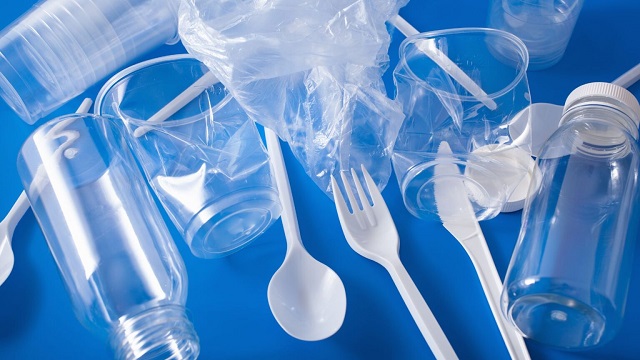Business
Canadian Constitution Foundation in court this week intervening in “plastics ban” case

From the Canadian Constitution Foundation
“In this case, criminal law power should not be allowed to justify the sweeping inclusion of every imaginable plastic product on the list of ‘toxic’ substances and therefore under the umbrella of federal authority,” … “The Cabinet Order plastic ban is outside the scope of the federal power.”
The Canadian Constitution Foundation (CCF) is appearing as an intervener in the legal challenge to the federal “plastics ban” being heard on June 25 and 26 at the Federal Court of Appeal. The CCF will be arguing that the federal “plastics ban” is outside the jurisdiction of Parliament’s criminal law power.
In November 2023, a Federal Court of Canada judge struck down the Trudeau government’s Cabinet Order declaring all “plastic manufactured items” as “toxic” under the List of Toxic Substances in Schedule 1 of the Canadian Environmental Protection Act. The Order had been challenged by a coalition of plastics companies who had argued that the Order was unreasonable and unconstitutional.
The appeal of that decision is now being heard at the Federal Court of Appeal. At issue is the scope of the federal law power. Section 91(27) of the Constitution Act grants the federal government exclusive authority to make criminal law. Previous court rulings have found and affirmed that prohibiting truly toxic substances, like lead and mercury, under the Canadian Environmental Protection Act is a legitimate expression of that power. But the criminal law power cannot be used to justify the sweeping inclusion of every imaginable plastic product onto the list of “toxic” substances and therefore under federal authority.
CCF Litigation Director, Christine Van Geyn said: “The criminal law power is not a magical incantation. Invoking the words ‘criminal law’ does not transform any issue into something Ottawa can regulate.”
“In this case, criminal law power should not be allowed to justify the sweeping inclusion of every imaginable plastic product on the list of ‘toxic’ substances and therefore under the umbrella of federal authority,” Van Geyn added “The Cabinet Order plastic ban is outside the scope of the federal power.”
The CCF is intervening in the case to argue about the scope of federal criminal law power. Criminal law powers should be applied cautiously. To claim authority to regulate something based on federal criminal law power, Parliament must clearly demonstrate the criminal aspect of the targeted activities. The federal government cannot assume control over an entire area which is not, in itself, harmful or dangerous. This is particularly important when Parliament has asserted control and jurisdiction over an amorphous subject matter prone to overlapping jurisdictions, like environmental regulation.
The Canadian Constitution Foundation is represented in its intervention by Brett Carlson and Rebecca Lang of Borden Ladner Gervais LLP.
You can read the CCF’s intervener factum here.
Business
Inflation Reduction Act, Green New Deal Causing America’s Energy Crisis


From the Daily Caller News Foundation
By Greg Blackie
Our country is facing an energy crisis. No, not because of new demand from data centers or AI. Instead, it’s because utilities in nearly every state, due to government imposed “renewable” mandates, self-imposed mandates, and the supercharging of the Green New Scam under the so-called “Inflation Reduction Act,” have been shutting down vital coal resources and building out almost exclusively intermittent and costly resources like solar, wind, and battery storage.
President Donald Trump understands this, and that is why on day one of his administration he declared an Energy Emergency. Then, a few months later, the President signed a trio of Executive Orders designed to keep our “beautiful, clean coal” burning and providing the reliable, baseload, and affordable electricity Americans have benefitted from for generations.
Those orders have been used to keep coal generation online that was slated to shut down in Michigan and will potentially keep two units operating that were scheduled to shut down in Colorado this December. In Arizona, however, the Cholla Power Plant in Navajo County was shuttered by the utility just weeks after Trump explicitly called out the plant for saving in a press conference.
Dear Readers:
As a nonprofit, we are dependent on the generosity of our readers.
Please consider making a small donation of any amount here.
Thank you!
Unlike states with green mandates, Arizona essentially has none. Instead, our utilities, like many around the country, have self-imposed commitments to go “Net Zero” by 2050. To meet that target, they have planned to shut down all coal generation in the state by 2032 and plan to build out almost exclusively solar, wind, and battery storage to meet an expected explosive growth in demand, at a cost of tens of billions of dollars. So it is no surprise that like much of the rest of the country, Arizona is facing an energy crisis.
Taking a look at our largest regulated utilities (APS, TEP, and UNS) and the largest nonprofit utility, SRP, future plans paint an alarming picture. Combined, over the next 15 years, these utilities expect to see demand increase from 19,200 MW to 28,000 MW. For reference, 1,000 MW of electricity is enough to power roughly 250,000 homes. To meet that growth in demand, however, Arizonans will only get a net increase of 989 MW of reliable generation (coal, natural gas, and nuclear) compared to 22,543 MW (or nearly 23 times as much) of intermittent solar, wind, and battery storage.
But what about all of the new natural gas coming into the state? The vast majority of it will be eaten up just to replace existing coal resources, not to bring additional affordable energy to the grid. For example, the SRP board recently voted to approve the conversion of their Springerville coal plant to natural gas by 2030, which follows an earlier vote to convert another of their coal plants, Coronado, to natural gas by 2029. This coal conversion trap leaves ratepayers with the same amount of energy as before, eating up new natural gas capacity, without the benefit of more electricity.
So, while the Arizona utilities plan to collectively build an additional 4,538 MW of natural gas capacity over the next 15 years, at the same time they will be removing -3,549 MW (all of what is left on the grid today) of coal. And there are no plans for more nuclear capacity anytime soon. Instead, to meet their voluntary climate commitments, utilities plan to saddle ratepayers with the cost and resultant blackouts of the green new scam.
It’s no surprise then that Arizona’s largest regulated utilities, APS and TEP, are seeking double digit rate hikes next year. It’s not just Arizona. Excel customers in Colorado (with a 100% clean energy commitment) and in Minnesota (also with a 100% clean energy commitment) are facing nearly double-digit rate hikes. The day before Thanksgiving, PPL customers in Rhode Island (with a state mandate of 100% renewable by 2033) found out they may see rate hikes next year. Dominion (who has a Net Zero by 2050 commitment) wanted to raise rates for customers in Virginia by 15%. Just last month, regulators approved a 9% increase. Importantly, these rate increases are to recover costs for expenses incurred years ago, meaning they are clearly to cover the costs of the energy “transition” supercharged under the Biden administration, not from increased demand from data centers and AI.
It’s the same story around the country. Electricity rates are rising. Reliability is crumbling. We know the cause. For generations, we’ve been able to provide reliable energy at an affordable cost. The only variable that has changed has been what we are choosing to build. Then, it was reliable, dispatchable power. Now, it is intermittent sources that we know cost more, and that we know cause blackouts, all to meet absurd goals of going 100% renewable – something that no utility, state, or country has been able to achieve. And we know the result when they try.
This crisis can be avoided. Trump has laid out the plan to unleash American Energy. Now, it’s time for utilities to drop their costly green new scam commitments and go back to building reliable and affordable power that generations to come will benefit from.
Greg Blackie, Deputy Director of Policy at the Arizona Free Enterprise Club. Greg graduated summa cum laude from Arizona State University with a B.S. in Political Science in 2019. He served as a policy intern with the Republican caucus at the Arizona House of Representatives and covered Arizona political campaigns for America Rising during the 2020 election cycle.
Business
Fuelled by federalism—America’s economically freest states come out on top

From the Fraser Institute
Do economic rivalries between Texas and California or New York and Florida feel like yet another sign that America has become hopelessly divided? There’s a bright side to their disagreements, and a new ranking of economic freedom across the states helps explain why.
As a popular bumper sticker among economists proclaims: “I heart federalism (for the natural experiments).” In a federal system, states have wide latitude to set priorities and to choose their own strategies to achieve them. It’s messy, but informative.
New York and California, along with other states like New Mexico, have long pursued a government-centric approach to economic policy. They tax a lot. They spend a lot. Their governments employ a large fraction of the workforce and set a high minimum wage.
They aren’t socialist by any means; most property is still in private hands. Consumers, workers and businesses still make most of their own decisions. But these states control more resources than other states do through taxes and regulation, so their governments play a larger role in economic life.
At the other end of the spectrum, New Hampshire, Tennessee, Florida and South Dakota allow citizens to make more of their own economic choices, keep more of their own money, and set more of their own terms of trade and work.
They aren’t free-market utopias; they impose plenty of regulatory burdens. But they are economically freer than other states.
These two groups have, in other words, been experimenting with different approaches to economic policy. Does one approach lead to higher incomes or faster growth? Greater economic equality or more upward mobility? What about other aspects of a good society like tolerance, generosity, or life satisfaction?
For two decades now, we’ve had a handy tool to assess these questions: The Fraser Institute’s annual “Economic Freedom of North America” index uses 10 variables in three broad areas—government spending, taxation, and labor regulation—to assess the degree of economic freedom in each of the 50 states and the territory of Puerto Rico, as well as in Canadian provinces and Mexican states.
It’s an objective measurement that allows economists to take stock of federalism’s natural experiments. Independent scholars have done just that, having now conducted over 250 studies using the index. With careful statistical analyses that control for the important differences among states—possibly confounding factors such as geography, climate, and historical development—the vast majority of these studies associate greater economic freedom with greater prosperity.
In fact, freedom’s payoffs are astounding.
States with high and increasing levels of economic freedom tend to see higher incomes, more entrepreneurial activity and more net in-migration. Their people tend to experience greater income mobility, and more income growth at both the top and bottom of the income distribution. They have less poverty, less homelessness and lower levels of food insecurity. People there even seem to be more philanthropic, more tolerant and more satisfied with their lives.
New Hampshire, Tennessee, and South Dakota topped the latest edition of the report while Puerto Rico, New Mexico, and New York rounded out the bottom. New Mexico displaced New York as the least economically free state in the union for the first time in 20 years, but it had always been near the bottom.
The bigger stories are the major movers. The last 10 years’ worth of available data show South Carolina, Ohio, Wisconsin, Idaho, Iowa and Utah moving up at least 10 places. Arizona, Virginia, Nebraska, and Maryland have all slid down 10 spots.
Over that same decade, those states that were among the freest 25 per cent on average saw their populations grow nearly 18 times faster than those in the bottom 25 per cent. Statewide personal income grew nine times as fast.
Economic freedom isn’t a panacea. Nor is it the only thing that matters. Geography, culture, and even luck can influence a state’s prosperity. But while policymakers can’t move mountains or rewrite cultures, they can look at the data, heed the lessons of our federalist experiment, and permit their citizens more economic freedom.
-

 Energy1 day ago
Energy1 day agoCanada’s future prosperity runs through the northwest coast
-

 Business2 days ago
Business2 days agoThe world is no longer buying a transition to “something else” without defining what that is
-

 Fly Straight - John Ivison2 days ago
Fly Straight - John Ivison2 days agoMPs who cross the floor are dishonourable members
-

 Business17 hours ago
Business17 hours agoFuelled by federalism—America’s economically freest states come out on top
-

 illegal immigration2 days ago
illegal immigration2 days agoEXCLUSIVE: Canadian groups, First Nation police support stronger border security
-

 illegal immigration1 day ago
illegal immigration1 day agoUS Notes 2.5 million illegals out and counting
-

 Business2 days ago
Business2 days agoBrutal economic numbers need more course corrections from Ottawa
-

 Daily Caller16 hours ago
Daily Caller16 hours ago‘There Will Be Very Serious Retaliation’: Two American Servicemen, Interpreter Killed In Syrian Attack




